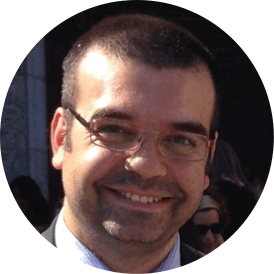There's more in normality than meets the eye
- Michael Panao
- 19 de ago. de 2016
- 2 min de leitura
What is the greatest challenge in science and faith?
Me. You. Every one of us.

What do I believe? What do you believe?
Throughout these years reading, researching and thinking about science and faith I've realized that everything that is said depends on each one of us, our philosophical assumptions, our lifestyle.
The Philosopher of Science and Scientist Michael Polanyi in his Magna Opera "Personal Knowledge" says
"The first point in my critique of doubt will be to show that the doubting of any explicit statement merely implies an attempt to deny the belief expressed by the statement, in favor of other beliefs which are not doubted for the time being."
When I read this excerpt, I thought:
there are no non-believers in this world.
We are all believers. It is our beliefs that differ.
What sets our beliefs?
I think it is how we experience our beliefs, our life experience, the experience we make with those surrounding us, and it is relationality that lead us to the truth about reality.
Saint Augustine said nisi credideritis, non intelligitis, meaning:
if you don't believe, you won't understand.
This reminds me something about the Holy Spirit.
Let's try to understand it.
Everything related with religious faith is beyond space and time.
This is what transcendence means.
So, how do we know a religious experience leading to an experience of God's presence is real?
When we state something is inspired by the Holy Spirit, how do we know it is not the fruit of our imagination (alone)?
If we arrive at the conclusion that an experience of the Holy Spirit is the fruit of our imagination, is there room for religious experience?

Clues to answer these questions can be found in an excellent book by Denis Edwards entitled "Breath of Life - a theology of the Creator Spirit", which I would like to share with you.
We have to assume that human imagination in an experience of the Holy Spirit doesn't imply denying a religious experience, but - like we said in the beginning of this post - it will always be filtered by our personality, our values.
The experience of the Spirit is lived in the normality of the human experience of the world. And an experience of the Spirit is not of the same order than an experience with created objects like a table, a smartphone or a flower. It is an experience going beyond space and time, of transcendence and openness to infinity. However, the unexpected reality is such experience occurs in the background of our everyday specific experiences.
Our normality.
Go figure.
We all live everyday experiences whether we believe in the Holy Spirit or not. And if transcendence is essential to normality, this means that a transcendent experience is accessible to every one. Some of us associate it with a religious experience or of the Holy Spirit, which is beyond the normality of every day because it occur within that normality. Seems a paradox. But isn't Christianity the greatest paradox of all?
Is this possible? Can we really experience transcendence in normality?
I believe so... for me it takes only a sunset. Have you seen one?
When the sunlight goes away,
an infinite vastness of a universe full of stars is revealed.







Comentários